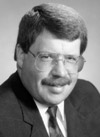 Wisconsin Lawyer
Wisconsin Lawyer
Vol. 79, No. 12, December
2006
Advising on Lawful Investigations
A new rule of professional conduct, unique to Wisconsin, guides
lawyers in providing legal advice to persons participating in lawful
investigations.
by Dean R. Dietrich
Question
Recent news reports have accused lawyers of engaging in wrongdoing by
hiring investigators who have used false pretenses to
obtain information for the lawyer. I also heard that the proposed new
Rules of Professional Conduct in Wisconsin address this issue.
What do the new Rules say?
 Dean R. Dietrich, Marquette 1977, of Ruder Ware,
Wausau, is chair of the State Bar Professional Ethics Committee.
Dean R. Dietrich, Marquette 1977, of Ruder Ware,
Wausau, is chair of the State Bar Professional Ethics Committee.
Answer
You are referring to recent articles concerning Hewlett-Packard and
steps taken by counsel for that corporation to oversee an internal
investigation to determine how information was leaked from its board of
directors meetings to the news media. This activity has been called
"pretexting" by the news media and involves the corporate
attorney hiring private investigators who use false pretenses to obtain
information about members of the board of directors and others.
This type of conduct, including the use of investigators to gain
access to information by false pretenses, is generally seen as contrary
to SCR 20:4.1 of the Rules of Professional Conduct. The current version
of SCR 20:4.1 provides as follows:
"In the course of representing a client a lawyer shall not
knowingly:
"(a) make a false statement of a material fact or law to a third
person; or
"(b) fail to disclose a material fact to a third person when
disclosure is necessary to avoid assisting a criminal or fraudulent act
by a client, unless disclosure is prohibited by Rule 1.6."
It is widely recognized that under Rule 20:4.1, a lawyer may not,
himself or herself or through other people, engage in
deceptive practices to gain information during the course of
representation. This would constitute the failure to disclose a material
fact if
the lawyer (or the lawyer's agent) uses false information to obtain
information from other people. While few complaints have
been brought under this rule, it is clear that the use of other people
to gather information by using false pretenses or false
information would be considered a violation of the rule.
The question of whether a lawyer may advise others on how to conduct
an investigation that may include the use of
false information, such as an undercover criminal investigation, was
raised before the Wisconsin Supreme Court as it reviewed the
Rules of Professional Conduct over the past 12 months. The Ethics 2000
Commission appointed by the Wisconsin Supreme
Court recommended a change to SCR 20:4.1 to allow prosecutors to give
legal advice to undercover officers so that they may
legally conduct undercover criminal investigations. After a great
deal of debate about this proposed change, the Wisconsin Supreme
Court adopted a new provision to SCR 20:4.1, which is found in SCR
20:4.1(b). This provision provides as
follows:
"(b) Notwithstanding paragraph (a) and Rules 5.3(c)(1) and 8.4,
a lawyer may advise or supervise others with respect to
lawful investigative activities."
The supreme court also added language to the Comment to the SCR
20:4.1 to give better guidance regarding the concept of
a lawful investigative activity. The court added the following to the
Comment:
"Wisconsin Committee Comment:
"Paragraph (b) has no counterpart in the Model Rule. As a
general matter, a lawyer may advise a client concerning
whether proposed conduct is lawful. See Rule 1.2(d). This is allowed
even in circumstances in which the conduct involves some form
of deception, for example the use of testers to investigate unlawful
discrimination or the use of undercover detectives to
investigate theft in the workplace. When the lawyer personally
participates in the deception, however, serious questions arise. See
Rule
8.4(c). Paragraph (b) recognizes that, where the law expressly permits
it, lawyers may have limited involvement in certain
investigative activities involving deception.
"Lawful investigative activity may involve a lawyer as an
advisor or supervisor only when the lawyer in good faith believes there
is a reasonable possibility that unlawful activity has taken place, is
taking place or will take place in the foreseeable future."
Under this provision, the supreme court recognizes that lawyers may
be called on to give legal advice on the procedures
that should be followed to conduct a lawful investigation. Examples
would include an undercover criminal investigation or the use
of testers to determine whether discriminatory conduct has taken
place.
New subsection (b) is unique and is not found in the Model Rules of
Professional Conduct. Very few states have adopted a
rule of this type to address the right of lawyers to give legal advice
in instances of lawful investigative activities. The Rule does
not, however, allow lawyers to directly participate in investigative
activities that would involve use of false pretenses or that are based
on false information. The subsection (b) exception to the requirements
of SCR 20:4.1 would apply only to circumstances in which
a lawyer is giving legal advice on how to conduct a lawful
investigation. The extent and scope of lawful investigations are yet to
be determined, but lawyers have been given some protection to allow
the provision of legal advice to persons participating in
lawful investigations.
The court has indicated that the new Rules of Professional Conduct
will become effective July 1, 2007. The State Bar
of Wisconsin will be conducting educational programs over the next six
months to explain the rule changes to Wisconsin lawyers.
Wisconsin Lawyer
